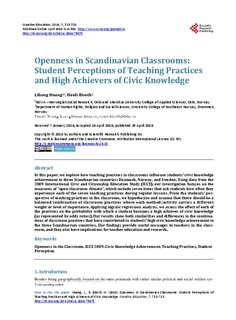Openness in Scandinavian Classrooms: Student Perceptions of Teaching Practices and High Achievers of Civic Knowledge
Abstract
In this paper, we explore how teaching practices in classrooms influence students’ civic knowledge achievement in three Scandinavian countries: Denmark, Norway, and Sweden. Using data from the 2009 International Civic and Citizenship Education Study (ICCS), our investigation focuses on the measures of “open classroom climate”, which include seven items that ask students how often they experience each of the seven teaching practices during regular lessons. From the students’ perspective of teaching practices in the classroom, we hypothesize and assume that there should be a balanced combination of classroom practices where each method/activity carries a different weight or level of importance. Applying logistic regression analysis, we assess the effect of each of the practices on the probability with which a student becomes a high achiever of civic knowledge (as represented by odds ratios). Our results show both similarities and differences in the combinations of classroom practices that have contributed to students’ high civic knowledge achievement in the three Scandinavian countries. Our findings provide useful messages to teachers in the classroom, and they also have implications for teacher education and research.

